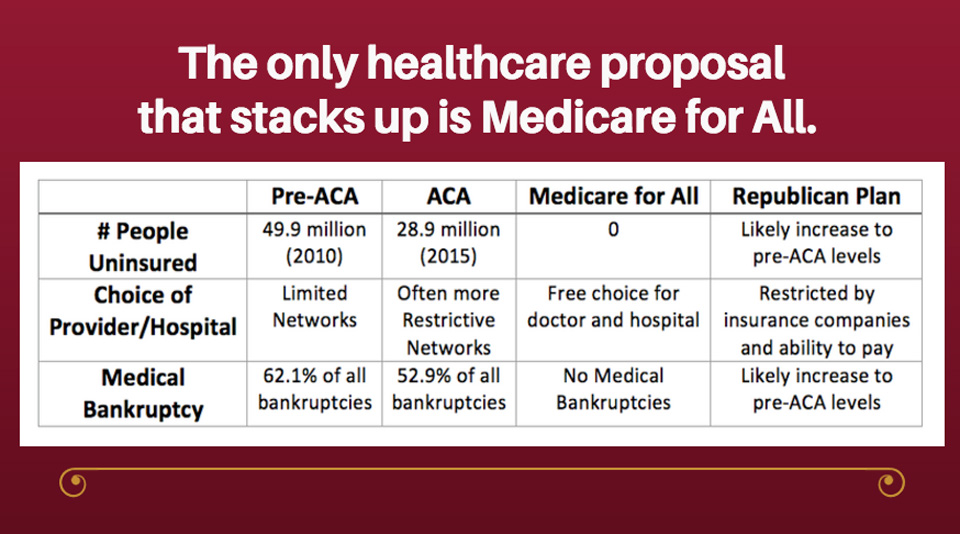
In the onrushing forced march towards the U.S. House vote on the Republican replacement for the Affordable Care Act, D.C. denizens – union leaders included – throw around big numbers. Cori Gambini, a registered nurse who’s also president of Communications Workers Local 1168 in Amherst, N.Y., prefers to talk about people.
And she doesn’t like what she hears coming out of Washington. In so many words, Gambini told other CWA activists in a teleconference call, millions of people will get hurt by losing coverage, thousands of workers will lose their jobs and her patients will suffer, too.
Which is why she implored her colleagues, in unions and out, to get on the phone to their lawmakers and to deluge congressional offices with protests up to and through the scheduled House health care votes on the evening of March 23, and beyond.
CWA staged the conference call as part of unions’ huge last-minute efforts to derail the Republican legislation, which Republican President Donald Trump also backs. His lobbying of wavering Republicans prompted one union leader, Unite Here President D Taylor, to re-label the GOP bill “Trumpcare,” recalling the Republicans’ derisive name, Obamacare, for the ACA.
And National Nurses United (NNU) Executive Director RoseAnn DeMoro calls the Republican legislation “a house of horrors.” She adds “Halloween is coming early” for worker fears. The NNU supports Medicare for All, or single payer health care, which would expand Medicare to pay for everyone’s health care and would replace market-based insurance.
To get lawmakers to reject the GOP measure, CWA posted a toll-free number, 855-980-2346, for people to call and be put through to their lawmakers. It also urged its members to visit lawmakers’ district and state offices and to talk about the practical effects of repeal of the ACA.
The SEIU posted two: 866-426-2631 (English) and 877-736-7831 (Spanish).
Other unions urged their members, families, friends and neighbors to inundate lawmakers’ offices with calls and visits. They also canvassed neighborhoods, distributed worksite flyers, ran print, online and media ads and targeted “swing” lawmakers.
Unite Here alone listed 15 potential GOP swing voters, including Peter Roskam of Illinois and Erik Paulsen of Minnesota. If 21 House Republicans defected and all the Democrats opposed the bill that replaces the ACA with the Republican measure, it dies.
“There will be up to 1 million jobs lost in health care alone,” if the GOP legislation, named America’s Health Care Act, replaces the 7-year-old Affordable Care Act (ACA), says Gambini. “That includes 47,000 jobs in New York State and close to 1,800 in our congressional district” around Buffalo. “Many of them are my sisters in Local 1168 and in Local 1133.”
Gambini based her figures on projections by the non-partisan Congressional Budget Office. CBO also calculated that 24 million out of the 28 million people who gained health care under the ACA would lose it under the GOP legislation. The GOP law enlarges the deficit, too.
For Gambini that loss of health care coverage translates into more pain and greater suffering for her patients, both insured and uninsured, as hospitals, which would lose funds and which are already short-staffed, see their deficits balloon and their nurse coverage shrink.
“We’ve been so short-staffed already at the bedside and this law would devastate our efforts to care for the acutely ill,” she says.
“As registered nurses, we don’t have a choice. We don’t know who has insurance and who doesn’t. We have to care for all of them,” Gambini adds. But if hospitals lack money to pay for care, thanks to the GOP bill, “everybody’s going to suffer the consequences,” insured or not, she notes.
One consequence is fewer nurses per patient. “With a staffing ratio of 1:8” – one nurse per eight acutely ill patients – “infection rates go up and quality of care goes down,” she warns.
Care quality will also decline because the newly uninsured will postpone care until they absolutely need it, and then head for hospital emergency rooms, Gambini and others explain.
And since the uninsured can’t pay full freight, their costs will be loaded onto those – the insured – who can, through higher premiums, larger co-pays and deductibles, lesser quality of care and larger out-of-pocket expenses for consumers.
CWA Legislative Director Shane Larson says before the ACA, such “uncompensated care” costs added $350-$1,000 yearly to an average employee’s out-of-pocket premiums.
Wait, it gets worse, Gambini warns.
Gambini estimated approximately one-quarter of Buffalo-area hospitals now run in the red. With reduced payments if the GOP legislation passes, she adds, that would become about one-half. “The hospital CEOs we’re talking to” in bargaining “are absolutely terrified.” That terror is reflected in contract talks with her local, as hospital execs push for cuts.
The American Hospital Association, the trade group for the nation’s 5,000 hospitals, backs Gambini up. It notes the GOP bill would cut current and future payments to hospitals, though it did not provide specific numbers in its letter to lawmakers, prior to CBO’s figures.
“But hospitals’ budgets will be cut and jobs will be lost,” Gambini says. Larson says other workers will suffer as hospitals and clinics can’t renovate or expand.
CWA, Unite Here and other unions and members campaigning against the Republican replacement for the ACA also stress some of the big impacts of the GOP scheme. Besides throwing 24 million people off the insurance rolls, they include:
- The one tax the GOP retains is the so-called “Cadillac tax” on health care plans that are allegedly high-value, because they cost the most. The Cadillac tax, which is in the ACA – although it was postponed to 2020 after union lobbying last year – would hit union health care plans the hardest, as well as plans that serve some of the sickest people.
- A large tax cut for the rich, accompanied by elimination of ACA taxes needed to cover Medicaid and the newly insured. CWA President Chris Shelton said “each of the 400 wealthiest households would get an average $7 million tax cut” from the GOP bill’s tax sections.
- An $880 billion 10-year cut in Medicaid, the health program for the poor. The GOP would also turn Medicaid into a block grant, forcing states to pick and choose how many – and which – people to cover.
- Some 1 million fewer people would be in employer-based health care coverage by 2020, and seven million by 2026, Larson says, citing CBO. Just over half of U.S. citizens have it. The proportion is far lower in small businesses, which the GOP would hit the hardest.
The union campaign won’t stop after the House vote. Larson explained the GOP wants to push its bill through Congress and land it on Trump’s desk before April 7, when Congress starts its next recess. Lawmakers don’t want to have to go home and face voters again, he said. But Senate Republicans hold only 52 of the 100 seats. If three defect, the bill is dead.
The “ACA’s coverage gains…are largely eviscerated by the GOP plan,” adds DeMoro, whose union is the largest RN union in the U.S. “Instead, we have a plan that again fetishizes a market-based healthcare fundamentalism that saw the U.S. plummet in a wide array of health care barometers, including infant mortality and life expectancy rates and people skipping needed care due to cost.”












Comments